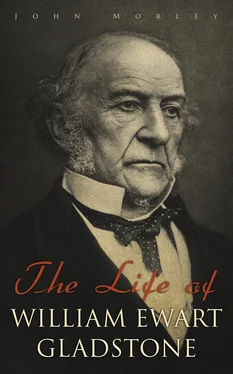IV
MR. DISRAELI'S PROPOSALS
The respite for ministers was short. The long day of shadowy promises and delusive dreams was over; and the oracular expounder of mysteries was at last gripped by the hard realities of the taxes. Whigs and Peelites, men who had been at the exchequer and men who hoped to be, were all ready at last to stalk down their crafty quarry. Without delay Disraeli presented his budget (Dec. 3). As a private member in opposition he had brought forward many financial proposals, but it now turned out that none of them was fit for real use. With a serene audacity that accounts for some of Mr. Gladstone's repulsion, he told the House that he had greater subjects to consider 'than the triumph of obsolete opinions.' His proposals dazzled for a day, and then were seen to be a scheme of illusory compensations and dislocated expedients. He took off half of the malt-tax and half of the hop duty, and in stages reduced the tea duty from two shillings and twopence to one shilling. More important, he broke up the old frame of the income-tax by a variation of its rates, and as for the house-tax, he doubled its rate and extended its area. In one of his fragmentary notes, Mr. Gladstone says:—
Having run away from protection, as it was plain from the first they would do, they had little to offer the land, but that little their minority was ready to accept. It was a measure essentially bad to repeal half the malt duty. But the flagrantly vicious element in Disraeli's budget was his proposal to reduce the income-tax on schedule D. to fivepence in the pound, leaving the other schedules at sevenpence. This was no compensation to the land; but, inasmuch as to exempt one is to tax another, it was a distinct addition to the burdens borne by the holders of visible property. It was on Disraeli's part a most daring bid for the support of the liberal majority, for we all knew quite well that the current opinion of the whigs and liberals was in favour of this scheme; which, on the other hand, was disapproved by sound financiers. The authority of Pitt and Peel, and then my own study of the subject, made me believe that it was impracticable, and probably meant the disruption of the tax, with confusion in finance, as an immediate sequitur. What angered me was that Disraeli had never examined the question. And I afterwards found that he had not even made known his intentions to the board of inland revenue. The gravity of the question thus raised made me feel that the day was come to eject the government.
ATTACK ON THE BUDGET
It was upon the increase of the house-tax that the great battle was finally staked. Mr. Gladstone's letters to his wife at Hawarden bring the rapid and excited scenes vividly before us.
6 Carlton Gardens, Dec. 3, 1852 .—I write from H. of C. at 4½ just expecting the budget. All seem to look for startling and dangerous proposals. You will read them in the papers of to-morrow, be they what they may. If there is anything outrageous, we may protest at once; but I do not expect any extended debate to-night.... The rush for places in the H. of C. is immense.
Monday, Dec. 6 .—On Saturday, in the early part of the day, I had a return, perhaps caused by the damp relaxing weather, of the neuralgic pain in my face, and in the afternoon a long sitting at Lord Aberdeen's about the budget, during which strange to say my pain disappeared, but which kept me past the ordinary post hour. These were the causes of your having no letter. The said budget will give rise to serious difficulties. It is plain enough that when its author announced something looming in the distance, he did not mean this plan but something more extensive. Even his reduced scheme, however, includes fundamental faults of principle which it is impossible to overlook or compound with. The first day of serious debate on it will be Friday next, and a vote will be taken either then or on Monday.
Dec. 8 .—Be sure to read Lord Derby's speech on Monday. His reference to the cause of his quarrel with Lord George Bentinck was most striking, and is interpreted as a rap at Disraeli. 273I have had a long sit with Lord Aberdeen to-day talking over possibilities. The government, I believe, talk confidently about the decision on the house-tax, but I should doubt whether they are right. Meantime I am convinced that Disraeli's is the least conservative budget I have ever known.
Dec. 14 .—I need hardly say the vision of going down to-morrow has been dissolved. It has been arranged that I am not to speak until the close of the debate; and it is considered almost certain to go on till Monday. Ministers have become much less confident, but I understand that some, I know not how many, of Lord John's men are not to be relied on. Whether they win or not (I expect the latter, but my opinion is naught ) they cannot carry this house-tax nor their budget. But the mischief of the proposals they have launched will not die with them.
Dec. 15 .—I write in great haste. Though it is Wednesday, I have been down at the House almost all day to unravel a device of Disraeli's about the manner in which the question is to be put, by which he means to catch votes; and I think after full consultation with Mahon and Wilson Patten, that this will be accomplished. The debate may close to-morrow night. I am sorry to say I have a long speech fermenting in me, and I feel as a loaf might in the oven. The government, it is thought, are likely to be beaten.
Dec. 16 .—I have been engaged in the House till close on post time. Disraeli trying to wriggle out of the question, and get it put upon words without meaning, to enable more to vote as they please, i.e. his men or those favourably inclined to him. But he is beaten in this point, and we have now the right question before us. It is not now quite certain whether we shall divide to-night; I hope we may, for it is weary work sitting with a speech fermenting inside one. 274
Dec. 18 .—I have never gone through so exciting a passage of parliamentary life. The intense efforts which we made to obtain, and the government to escape, a definite issue, were like a fox chase, and prepared us all for excitement. I came home at seven, dined, read for a quarter of an hour, and actually contrived (only think) to sleep in the fur cloak for another quarter of an hour; got back to the House at nine. Disraeli rose at 10.20 [Dec. 16], and from that moment, of course, I was on tenterhooks, except when his superlative acting and brilliant oratory from time to time absorbed me and made me quite forget that I had to follow him. He spoke until one. His speech as a whole was grand; I think the most powerful I ever heard from him. At the same time it was disgraced by shameless personalities and otherwise; I had therefore to begin by attacking him for these. There was a question whether it would not be too late, but when I heard his personalities I felt there was no choice but to go on. My great object was to show the conservative party how their leader was hoodwinking and bewildering them, and this I have the happiness of believing that in some degree I effected; for while among some there was great heat and a disposition to interrupt me when they could, I could see in the faces and demeanour of others quite other feelings expressed. But it was a most difficult operation, and altogether it might have been better effected. The House has not I think been so much excited for years. The power of his speech, and the importance of the issue, combined with the lateness of the hour, which always operates, were the causes. My brain was strung very high, and has not yet quite got back to calm, but I slept well last night. On Thursday night [ i.e. Friday morning] after two hours of sleep, I awoke, and remembered a gross omission I had made, which worked upon me so that I could not rest any more. And still, of course, the time is an anxious one, and I wake with the consciousness of it, but I am very well and really not unquiet. When I came home from the House, I thought it would be good for me to be mortified. Next morning I opened the Times , which I thought you would buy, and was mortified when I saw it did not contain my speech but a mangled abbreviation. Such is human nature, at least mine. But in the Times of to-day you will see a very curious article descriptive of the last scene of the debate. It has evidently been written by a man who must have seen what occurred, or been informed by those who did see. He by no means says too much in praise of Disraeli's speech. I am told he is much stung by what I said. I am very sorry it fell to me to say it; God knows I have no wish to give him pain; and really with my deep sense of his gifts I would only pray they might be well used.
Читать дальше









![William Frith - John Leech, His Life and Work. Vol. 1 [of 2]](/books/747171/william-frith-john-leech-his-life-and-work-vol-thumb.webp)


![William Frith - John Leech, His Life and Work, Vol. 2 [of 2]](/books/748201/william-frith-john-leech-his-life-and-work-vol-thumb.webp)